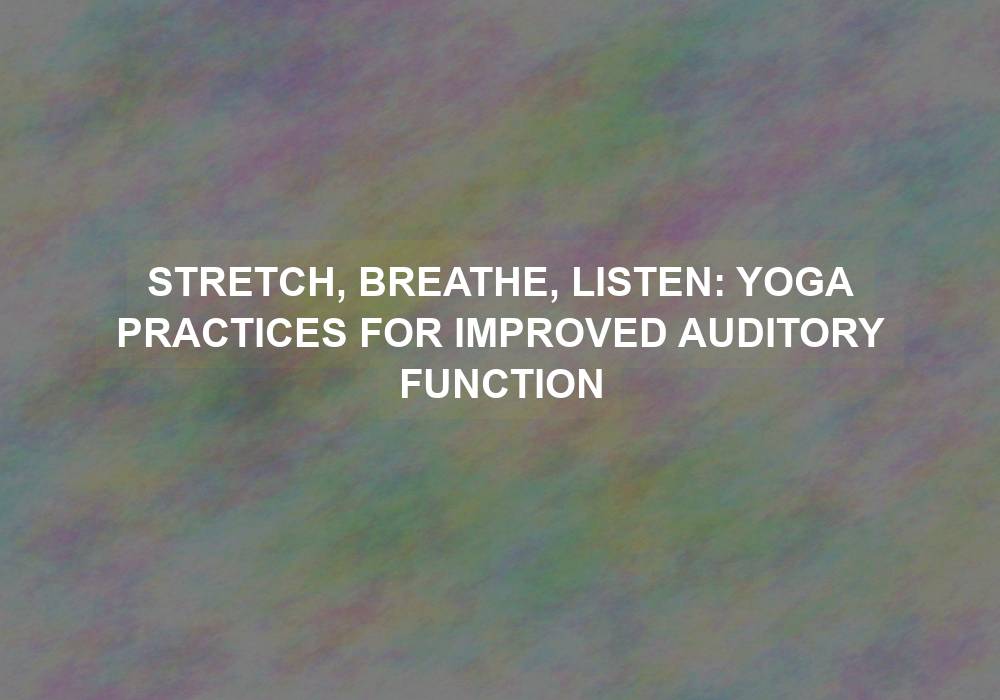In our modern, fast-paced world, it’s easy for our senses to become overwhelmed and fatigued. Our auditory system, responsible for processing sound and providing us with the gift of hearing, is no exception. If you’re looking for ways to enhance your auditory function and protect your hearing, incorporating yoga practices into your daily routine can be incredibly beneficial.
The Connection Between Yoga and Auditory Function
Yoga is a holistic practice that goes beyond just physical exercise. It encompasses various techniques such as postures, breathing exercises, meditation, and mindfulness. By engaging in yoga, we can improve our overall well-being, including our auditory function.
Yoga postures and stretches help release tension in the body, including the neck and shoulders, which can impact our auditory system. The neck rolls, for example, involve gently rolling your neck in a circular motion, moving from side to side. This simple stretch helps relieve tension in the neck and shoulders, promoting better blood circulation to the ears. Incorporating shoulder openers, where you interlace your fingers behind your back and gently lift your arms while keeping your shoulders relaxed, can also release tension in the upper body and improve blood flow to the ears.
Additionally, forward folds in yoga increase blood flow to the head and neck region, benefiting the ears and auditory system. By standing with your feet hip-width apart and slowly bending forward at the waist, allowing your head and arms to hang loosely, you can encourage better circulation in the auditory area. These stretching exercises not only improve flexibility but also promote auditory health.
Breathing Techniques for Auditory Function
Breathing exercises are an integral part of yoga and can significantly impact our auditory function. Alternate nostril breathing, for instance, involves sitting in a comfortable position and using your right thumb to close your right nostril. Inhale deeply through your left nostril, then close it with your ring finger. Open your right nostril and exhale. This pattern is repeated, alternating nostrils with each breath. Alternate nostril breathing enhances our lung capacity and oxygen supply, which supports the overall health of our auditory system.
Another beneficial breathing technique is Lion’s Breath. By sitting in a cross-legged position and taking a deep breath in through your nose, you can exhale while opening your mouth wide and sticking your tongue out, making a “ha” sound. This breath helps release tension in the face, jaw, and throat, indirectly benefiting auditory function. The relaxation of these areas can contribute to improved auditory processing.
Ujjayi breathing is another technique that promotes better auditory function. By sitting comfortably and inhaling deeply through your nose, then exhaling through your nose while slightly constricting the back of your throat, you create a gentle oceanic sound. Ujjayi breathing helps relax the mind and body, supporting better auditory processing and overall auditory health.
Mindfulness and Meditation for Auditory Health
Mindfulness and meditation practices are essential components of yoga that can enhance auditory function. Sound meditation, for example, involves finding a quiet space, closing your eyes, and focusing your attention on the sounds around you. Without judgment, simply observe the different sounds without attaching any meaning to them. This practice enhances our ability to listen and strengthens our auditory focus.
Practicing mindful listening throughout your day can also have a positive impact on your auditory system. Make an effort to actively listen to the sounds you encounter, whether it’s the chirping of birds or the hum of traffic. Consciously tuning in to each sound allows your auditory system to fully engage and process the auditory stimuli, promoting better auditory health.
Incorporating a gratitude practice into your daily routine can also foster a healthier relationship with your sense of hearing. Take a moment each day to express gratitude for your ability to hear. Reflect on the sounds that bring you joy and appreciation. Cultivating gratitude helps shift our focus towards the positive aspects of our auditory experiences, contributing to improved auditory function and overall well-being.
Conclusion
By incorporating these yoga practices into your daily routine, you can enhance your auditory function and promote overall auditory health. Stretching exercises relieve tension in the neck and shoulders, promoting better blood circulation to the ears. Breathing techniques increase oxygen supply, supporting the health of the auditory system. Mindfulness and meditation practices strengthen auditory focus and improve our ability to listen. Embrace the power of yoga to stretch, breathe, and listen, and unlock the potential for improved auditory function in your life.
